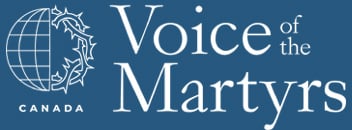Tags
Sudan
-
Sudanese Constitution Signed Allowing Religious Freedom
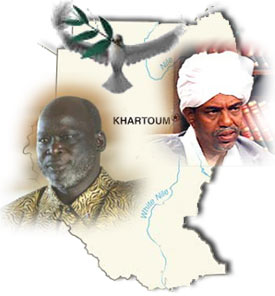 July 6 was an historic day in Sudan, as Sudan's National Assembly passed a new constitution, stepping back from full Islamic rule. John Garang, former head of the SPLM rebel movement in southern Sudan was also sworn in as vice-president on July 9, and he took leadership of the autonomous administration running the affairs of the predominantly Christian and animist southern region of Sudan.
July 6 was an historic day in Sudan, as Sudan's National Assembly passed a new constitution, stepping back from full Islamic rule. John Garang, former head of the SPLM rebel movement in southern Sudan was also sworn in as vice-president on July 9, and he took leadership of the autonomous administration running the affairs of the predominantly Christian and animist southern region of Sudan.For years Sudan suffered under the ravages of a civil war involving oil rights along with racial and religious differences between southern Sudan and the Muslim-controlled government. The civil war ended when peace talks finally brought a lasting peace accord in January 2005. Under the new constitution, Islam is recognized as the majority religion in the country, but notes the place of Christianity and traditional religions. Under the peace agreement, a referendum is to be held in six years to decide if southern Sudan will gain full independence.
Praise God for the progress that has been made in Sudan. Pray that religious freedom will be respected in all areas of the country and that Christians will be truly free to practice their faith. Pray for the leaders of Sudan, as they lay out the course for their country in the coming days.
For more information on the difficulties Christians have been facing in Sudan,click here.
-
Class Action Lawsuit Hits Roadblock
A New York federal judge ruled on Monday (March 28, 2005) that a lawsuit launched by the Presbyterian Church of Sudan against Talisman Energy Inc. could not proceed. The class action suit was filed two years ago on behalf of 250,000 non-Muslim Sudanese who were forcibly displaced to make room for Talisman's oil development in southern Sudan during the four years that the company worked there. The Presbyterian Church of Sudan was seeking damages that would have exceeded $1-billion in compensation to the victims. The judge ruled that the plaintiffs would be unable to differentiate which of the hundreds of attacks during a six-year period were caused by the Sudanese government's alleged campaign of genocide and rival fighting between rebel groups. She said that the core question in the case is whether the plaintiff's suffering was caused by the government's actions or Talisman's. This, she concluded, is fundamentally an individual question. If the lawsuit continues, it is expected that it will now only involve the seventeen Sudanese individuals directly named as plaintiffs. This will, of course, significantly reduce potential damages to Talisman.
Talisman Energy sold its stake in Sudan two years ago to India's ONGC Videsh Ltd., after intense pressure from human rights and religious liberty groups like The Voice of the Martyrs who maintained that Talisman was helping fuel Sudan's civil war and slaughter of civilians in south Sudan.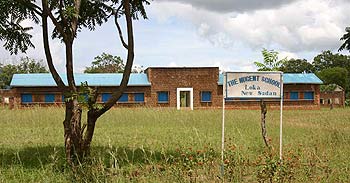 The Nugent School in Loka, Sudan
The Nugent School in Loka, Sudan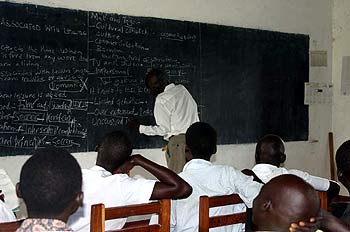
The Voice of the Martyrs is continuing to work in southern Sudan in rebuilding the lives of Sudan's Christians after so many years of war and persecution. In the last year, through the mission's Relief and Development Fund, VOM Canada has invested over $120,000 CDN in the establishment of a school in Loka, Sudan in partnership with Global Response Network. For more information on how you can help rebuild the lives of Sudan's Christians, contact us. Those in the United States are urged to contact Global Response Network at http://www.grnconnect.org/.
For more information on the difficulties facing Christians in Sudan, click here. A new music video featuring suffering Christians in Sudan is available in the Video section of VOM's multimedia website, www.vomcanada.com.
-
Darfur: A Religious Liberty Issue?
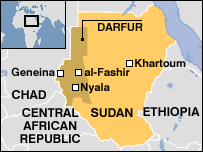 For many evangelical Christians, any news of war and suffering in Sudan immediately conjures up thoughts of persecution of black Christians by troops or militias loyal to Khartoum's Islamist government. Of course, I'm glad for this increased awareness, for when I joined The Voice of the Martyrs in 1997, almost no one had heard of the brutal persecution in this east African country. Thankfully, this lack of publicity has significantly changed in the last seven years, especially within the Christian community here in North America.
For many evangelical Christians, any news of war and suffering in Sudan immediately conjures up thoughts of persecution of black Christians by troops or militias loyal to Khartoum's Islamist government. Of course, I'm glad for this increased awareness, for when I joined The Voice of the Martyrs in 1997, almost no one had heard of the brutal persecution in this east African country. Thankfully, this lack of publicity has significantly changed in the last seven years, especially within the Christian community here in North America.So when news reports of the crisis in the Darfur region of western Sudan began to circulate and world governments began to pressure the Sudanese government to put an end to the conflict there, it was assumed by many that this was just a continuation of the war in southern Sudan. There are distinct differences, however, that need to be noted. The conflict in Darfur is between the Janjaweed, a Sudanese-government-supported armed militia recruited from local Arab tribes, and the black African peoples of the region. The conflict has been widely described as "ethnic cleansing" and that is very much what it is.
The conflict began in early 2003 after local rebel groups, the Justice and Equality Movement (JEM) and the Sudanese Liberation Movement (SLA) who had long accused the government of oppressing black Africans in favour of Arabs, attacked government forces and installations. The government was caught by surprise and had very few troops in the region and a large proportion of them were of Darfur origin. Given this, the government found itself in the position of being unsure whether it could trust many of its own units. Its response was to mount a campaign of aerial bombardment supporting ground attacks by an Arab militia recruited from local tribes and armed by the government, dubbed the "Janjaweed." While the conflict has a political basis, it has also acquired an ethnic dimension as civilians were deliberately targeted on the basis of their ethnicity. An insightful editorial by Salim Mansur in today's (August 18, 2004) London Free Press (click here) underlines the racial bigotry behind this tragedy and why the Arab world has not intervened on behalf of their black Muslim "brothers" in Darfur.
An economic dimension is also present related to the long standing competition between pastoralists (generally Arab) and farmers (generally non-Arab) for land and water. Religion plays a relatively minor role in this conflict, as both sides are predominantly Muslim. In fact, in a strange twist, the Economist reported in May that the Janjaweed were said to have "torched dozens of mosques and torn up and defecated on copies of the Koran." Hence, this present conflict cannot, in my opinion, truly be said to be a religious conflict. It is a human rights and humanitarian crisis, to be sure, but to seek to address it as a religious liberty issue would be inaccurate. This is why The Voice of the Martyrs has chosen to remain silent about this terrible tragedy.
It is not that we have not wanted to say something. It is not easy to watch such a travesty take place in a country which I have visited on a number of occasions and where we have invested a great deal of time and resources. But for over 30 years, The Voice of the Martyrs has had only one mandate: to serve the persecuted Christians worldwide. There are two key words in that mandate: Christians and persecuted. The crisis in Darfur only indirectly affects the few Christians in the region and their suffering has to do with their ethnicity more than their faith. If the believers there converted to Islam, it is entirely likely they would still suffer from Janjaweed attacks. The situation there also cannot be said to be one of religious persecution. The intolerance being demonstrated is not for religious reasons but for ethnic and economic ones. There is nothing that I have seen or read that would compel me to think that one side is trying to force the other to embrace another religious belief system, even a more militant form of Islam. I have often said that when persecution starts to mean anything, it will soon come to mean nothing. In my opinion, those who would try to link the Darfur crisis to a religious liberty issue run the risk of contributing to the watering down the concept until it means virtually nothing.
That is not to say, however, that Christians ought not to speak up against the atrocities going on in Darfur and seek to find ways to help. All human beings, created in the image of God, have the right to life, its necessities and freedom from abuse. These rights are being seriously threatened by the ongoing conflict in Darfur. There are a number of organizations involved in relief work in the region as any search on Google or Yahoo will reveal. We urge you to seek God's direction as to how you can respond.
For information on persecution of Christians in Sudan,click here.
-
Episcopal Church Evicted from Church Property
On May 20 at 9:00 a.m., Khartoum police served a court order to the Episcopal Church in Sudan (ECS), evicting them from their guesthouse which also served as their provincial office. Armed riot police were stationed outside to ensure compliance. To prevent any injury, the occupants vacated the building as ordered. The police then entered the building and ordered that all furniture, carpets and effects be removed from the premises. Trucks were brought in and everything was removed.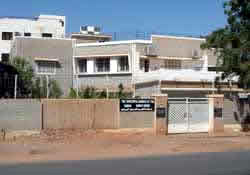
Episcopal Church in Sudan guesthouse in KhartoumAccording to a May 22 report from Middle East Concern, the problem began with Gabriel Roric Jur who had been removed as bishop in May 2003. Impersonating the archbishop of the ECS, Roric sold the property to an Arab businessman two months ago. As bishop, Roric had been originally named as trustee of the property when it was purchased in 1993 but refused to turn over the ownership papers to the ECS when asked to do so in 2002.
Criminal charges have been filed against Roric, accusing him of misrepresenting the church and impersonating the archbishop of Sudan. Church leaders believe that the government may be behind Roric's actions. Roric was widely believed to be an agent of the Sudanese security forces. Accusations that he had demonstrated over a long period of time a greater loyalty to the Sudanese security police than to the ECS led to his being defrocked as bishop in 2003. Roric continues to have significant contacts with government authorities.
On May 22, the Episcopal Church of Sudan sent an official protest letter to the Sudanese government. To read this letter, click here.
Pray that this issue will be resolved and that the property will be returned to the church. Pray that Roric will see the error of his ways. Pray that the church will be a testimony to those around throughout these difficulties.
For more information on Sudan and the challenges facing Sudanese Christians,click here.
-
Christian Woman Punished for Not Following Sharia Law
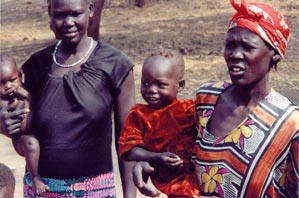
Christian women from Southern Sudan
One of the main topics of negotiation in the peace talks in Sudan has been the implementation of sharia law for non-Muslims. An April 28 news release from Compass Direct reports that a young Christian woman in the capital city of Khartoum was beaten and fined for not wearing appropriate head covering.
Cecilia John Holland was traveling on a transit bus on the evening of April 13 when ten public-order policemen stopped the bus and arrested her. When she protested that she was a Christian and from the south, she was struck in the neck and forced into a van with other women deemed to be dressed inappropriately. The next day she was taken to the Sizana Islamic Court where she was not allowed to speak in her defense. She was found guilty and sentenced to 40 lashes fined 10,000 Sudanese dinars ($50 Cdn).
The Khartoum government claims that the issue of sharia law in Khartoum and other primarily Muslim areas of northern Sudan has been resolved; that the southern leadership (the SPLM) have agreed to a single Islamic law in the north. This claim has been denied by an SPLM spokesman.
Pray that the peace talks in Sudan will succeed and that both sides will be willing to negotiate in good faith. Pray for Cecilia and other Christians living in northern Sudan, as they face the challenges of an imposed sharia law.
For more information on Sudan,click here. The Voice of the Martyrs has been actively ministering to Christians in Sudan for several years. Last January, as part of the mission's annual Operation Christmas Blessing, VOM carried out a major distribution of school packets for students in eastern Sudan. To view a brand new video report of the project go to our multimedia site, PersecutionTV (click here).
-
Peace Talks Resume
Talks to end the longest current civil war in the world resumed February 17 between the government of Sudan and the SPLM in the south. Speaking to AFP, both sides say they are determined to find a permanent resolution. This round of talks, which many hope will result in a final peace agreement, is scheduled to end on March 16. The focus of negotiations is on the status of three disputed areas, Abyei, Nuba Mountains and Southern Blue Nile, as well as political and administrative power sharing. There has already been an agreement signed on sharing oil revenues and a transition of power in southern Sudan leading to the right to self-determination for southern Sudan by 2008 as well as tentative agreements on the Nuba Mountains and Southern Blue Nile.
There are continuing concerns, however, that the government will stall the talks to prevent a final agreement which could erode their control over the oil-rich resources of southern Sudan, as well as the desire of many to create a strictly Islamic nation.
The twenty-year civil war between the predominantly Muslim north and the Christian and animistic south has killed at least 1.5 million people and displaced as many as four million others. Government forces have regularly attacked civilian targets, including schools, hospitals and churches, along with relief organizations providing aid to the victims of war in southern regions. The Voice of the Martyrs recently completed a major distribution of school supplies for students of two schools in the Upper Nile region of southern Sudan through their Operation Christmas Blessing program.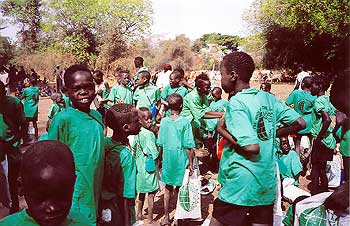
Sudanese students receive school supplies from VOM (Jan.2004)Pray that both sides will negotiate in good faith and that any hesitations or schemes to prevent peace will be thwarted.
For more background information on the situation in Sudan, go towww.vomcanada.com/sudan.htm.
-
Special Interest Group Claims Christians Are Being Misled: A Rebuttal
For the last month, a U.K-based body calling itself the European-Sudanese Public Affairs Council has been circulating emails and submitting "news" reports in newspapers such as Addis Tribune, claiming that groups such as The Voice of the Martyrs, Servant's Heart, Freedom Quest International and others are misleading the public with inaccurate reporting on atrocities committed by the Sudanese government over the last several years. It is worth noting that this organisation has been set up to foster economic development in Sudan and to oppose media coverage that could be seen as detrimental to interests in Sudan. As such ESPAC has a record of hostility towards relief and human rights organisations that have criticised Sudan's human rights record. The Voice of the Martyrs will continue to speak out about the appalling human rights abuses in Sudan, and we would advise you to disregard any correspondence you might receive or read from ESPAC as being the kind of misleading propaganda that it claims to oppose. -
Peace Process Update
Many have been carefully following the peace talks between the government of Sudan and the rebel army because of the significant impact on Christians in southern Sudan. On July 22, the Religious Liberty Conference of the World Evangelical Alliance released an update on the peace process. Below is the update, as released:
UPDATE ON THE SUDAN PEACE PROCESS
Elizabeth Kendal
World Evangelical Alliance - Religious Liberty e-mail Conference.
http://www.worldevangelical.org/rlc.htmlMACHAKOS TALKS - JULY 2002
Twelve months ago, on 20 July 2002, a historic peace deal was signed in Machakos, Kenya, between the Government of Sudan (GoS) and the Sudan People's Liberation Movement/Army (SPLM/A). That document, known as the Machakos Protocol, provided a 'roadmap' for peace in Sudan.
The Sudan peace talks are sponsored by the regional Inter-Governmental Authority on Development (IGAD), which groups Djibouti, Eritrea, Ethiopia, Kenya, Sudan, Uganda and nominally Somalia.
The Machakos Protocol granted Southern Sudan the right to hold an internationally supervised referendum on independence after six years of autonomous rule, and full religious freedom. Of course many hurdles lay ahead. The issues of power-sharing, wealth-sharing and religious freedom still loomed large. Efforts to resolve these issues would test the signatories' commitment to peace as talks progressed over the following year.
However, Machakos only happened because after 11 September 2001, the GoS came under intense international pressure to make peace, primarily from a US administration waging a war on international terrorism. It was a watershed moment for Sudan.
After the signing of the Machakos Protocol, Rev. Enock Tombe of Sudan's Council of Churches said "both sides now must move quickly to remove the remaining hurdles to peace before momentum is lost." Unfortunately, as international attention has drifted elsewhere - primarily to Iraq and the "axis of evil" (which did not include Sudan) - hurdles have not been removed and momentum, along with international attention, pressure and patience, has waned. The concern is now that the peace process may flounder.
----------------------------------------------------------
Machakos was a deal between the GoS and the SPLM/A. Yet for any peace deal to work, it had to include the other opposition parties, it had to be widened; it had to have a national consensus.
KHARTOUM DECLARATION
On Saturday 24 May 2003, John Garang, who heads the Sudan People's Liberation Army (SPLA) and Sadeq al-Mahdi, head of the Umma Party, and Mohamed Osman al-Mirghani, leader of the Democratic Unionist Party, met for talks in Mirghani's home in Cairo where he lives in exile.
"Any peace agreement reached in Machakos will require a national consensus," said Garang. "We are doing the homework for this consensus." (AFP 25 May) One appeal to come from this meeting was that the national capital, Khartoum, be ruled under secular rather than Islamic laws.
Presidential Peace Adviser Ghazi Salah Eddin Atabani said this was out of the question. President Omar el-Beshir declared Khartoum "will never be secular and we will sacrifice our souls" to prevent this. "We took power on June 30 (1989) to foil a conspiracy for abrogating Islamic Sharia." He said opposition leaders Mahdi and Mirghani "are planning to undermine the negotiations and thus torpedo the entire peace process" (AFP 18 June). "Any attempt to renegotiate that (Khartoum's religion) question will mean undermining the peace talks and aborting the peace process," said el-Beshir (AP 19 June).
Then in early July, 18 opposition parties, 15 non-government organizations and more than 40 individual opposition leaders signed The Khartoum Declaration, which calls for Khartoum to be a national secular capital, an end of one-party rule, a release of political prisoners and a transitional government to supervise general elections. The Khartoum Declaration was due to be unveiled to the media on 2 July, but a government crackdown on opposition figures prevented it.
ISLAMIST PRESSURE
There is a lot of Islamist pressure rising in Khartoum. On 26 June, some 5,000 armed fighters of the Islamist Popular Defence Force (PDF) rallied in Khartoum vowing to support jihad and el-Beshir's "revolution of national salvation" (national Islamisation). (DPA 27 June). On 4 July, Khartoum's leading islamist scholars issued a fatwah: "Whoever approves or calls for the application of a ruling other than the Islamic Shariah - like those who call for socialism or communism or other subversive beliefs that contradict Islamic thought - is, frankly, an apostate," and as such deserves to be killed. Fourteen prominent scholars, including two university professors, signed the fatwah. (AP 4 July).
NAKURU TALKS - JULY 2003
From 6 - 11 July, meetings that were supposed to be the final stage of IGAD mediated talks were held in Nakuru, 160km (100 miles) west of Nairobi, Kenya. Those talks were intended to finalise the outstanding issues of the status of three disputed regions -- Abyei, Southern Kordofan (Nuba Mountains), and the Blue Nile - as well as power-sharing, wealth-sharing, security arrangements during the six-year transition period, and religious freedom. Also, final documents were to be drafted for the parties to sign in mid-August.
The GoS negotiators looked at the draft document presented to them by IGAD and rejected it. A major stumbling block was the call for Khartoum to be a shared and secular capital (for north and south).
TALKS FAIL
The SPLM/A saw the draft presented in Nakuru as a basis for peace. "For us, we see it as a way forward," an SPLA source said. "We are very happy with the draft, not that we agree with all the issues but it is a basis." (Reuters 11 July).
However, the GoS response was toxic. President Omar al-Beshir told the Kenyan-based IGAD mediators that if they insisted on pushing the draft peace settlement rejected by his negotiators, then "IGAD and those behind it" could "go to hell". He told the IGAD mediators to "come up with a reasonable alternative, otherwise they have to dissolve the document in water and drink it." El-Beshir then gave a speech at Nur al-Dinn, on how Sudanese government troops had fought a 20-year war to defend Islam. El-Beshir declared his government "is committed to peace but not to surrender" (AFP 15 July).
Amin Hassan Omer, a negotiator for the GoS, described the draft as "contrary to the contents of the Machakos framework . unfair, contradictory and unfit to constitute a basis for negotiation" (DPA 12 July). The GoS has blamed IGAD for the failure of the talks and requested intervention from Egypt and the Arab League to help break the impasse (AFP 14 July). The GoS Presidential Peace Advisor, Ghazi Salah Eddin Atabani, complained that the draft proposals "differ largely" from the Machakos Protocol and "pave the way for secession
of southern Sudan while Machakos calls for unity." Atabani has requested "entirely new proposals" (AFP 13 July).The Sudan Council of Churches strongly rejects the GoS assessment, saying that the draft is indeed fair and in line with the Machakos Protocol. They also expressed concern about interference from Arab nations and the GoS request for alternative mediators, and called on the parties to return to the negotiating table. (Link 1)
The IGAD chief mediator, General Lazaro Sumbeiywo, also disagrees with the GoS assessment, maintaining that the peace draft is fair, impartial, balanced and supported by the international community.
"END GAME"
There is great concern that Washington, which appears to be running out of patience and commitment, might buckle under pressure from Khartoum and press for a "peace at any cost" deal. John Danforth, the special envoy of the US President George W. Bush in Sudan, has expressed his frustration, declaring that this is the "end game", and warning that the international community would divert its attention from Sudan if an agreement is not be made very quickly (Link 2).
It is unlikely that the GoS would view that as a threat -- probably more of an opportunity -- while it would truly signal an "end game" scenario for the Southern Sudanese. Even as the Nakuru talks were getting underway the GoS was resupplying its southern military garrison in Juba in direct violation of the Memorandum of Understanding of 15 October 2002.
The GoS has repeatedly terrorised and starved its people and violated ceasefire agreements with impunity -- and impunity equals permission. As such, one wonders whether the GoS has any desire to pursue peace or even if they have any reason to.
The GoS is a brutal regime that stops at nothing. Just last week GoS warplanes conducted bombing raids of twenty-five villages in northwest Darfur, western Sudan, killing at least 300 villagers and wounding 200, with many dying as victims of a "toxic gas". The GoS targeted the region because it believes the inhabitants support an opposition movement. (AFP 20 July). It is not the first time the GoS has used chemical or biological weapons. This is a regime that has used starvation as a weapon of mass destruction.
------------------------------------------------------------
A rejection of the IGAD mediation and draft peace proposals would seriously undermine the very principle of a diplomatic, democratic peace process, and fail the long-suffering people of Sudan who have lived with poverty, jihad and repression for far too long. Negotiations are supposed to recommence on 23 July, but there is already talk of postponement.
------------------------------------------------------------
Links
1) Sudan Council of Churches Speaks On Peace Process Catholic Information Service for Africa, Nairobi, 18 July 2003
2) Danforth: we have reached the end of the game in Sudan Sudan-USA, Politics, ArabicNews.com 7/19/2003 (http://www.arabicnews.com/ansub/Daily/Day/030719/2003071909.html)
For further background see: WEA RLC Sudan - Translating a Document into a Reality, 26 July 2002 (http://www.worldevangelical.org/persec_sudan_26jul02.html)
For news on Sudan (including the other articles referred to in this posting) see (http://www.sudan.net/news/news.html)
-
Islamic Leaders Issue Fatwah
As peace talks between the Sudanese government and southern rebels resumed in Kenya, and in advance of student union elections at Khartoum University, leading Islamic scholars issued a "fatwah" or religious edict on Friday, July 4. The fatwah, published in the independent weekly Akhbar Alyoum and signed by fourteen prominent scholars, including two university professors, declared that communists, socialists and others adhering to non-Sharia law in Sudan are apostates deserving of death.
The latest round of peace talks started on Sunday as a debate raged in Khartoum over whether Khartoum should become a secular national capital accommodating different religious creeds and beliefs. Last Wednesday, eighteen opposition parties, fifteen non-government organizations and more than forty individual opposition leaders released a declaration calling for Khartoum to be a national "secular" capital in the event of a peace deal between the Islamist government in Khartoum and the SPLA, which has been fighting for the rights of Christians and animists. The Khartoum Declaration also called for the end of one-party rule during a transition period of six years, as well for a transition government designed to supervise general elections. Last month, Sudanese President Omar el-Bashir lashed out at his leading opponents for advocating a national capital free of Islamic Sharia laws. In the last week, several opposition leaders involved in drafting the declaration have been arrested.
Last July, the Sudanese government and the SPLA signed a protocol providing for the separation of state and religion in southern Sudan. Glenn Penner, spokesman for The Voice of the Martyrs, said, "It is obvious that this separation will not extend to the parts of the country where the government maintains control. We must not be so naïve as to believe that the Islamist government of Sudan has modified its position on the preeminence of Sharia law in Sudan as a whole. This is a brutal regime with a shameful human rights record regarding religious liberty."
Pray for those who are advocating religious liberty throughout Sudan. Pray that the international community will continue to hold Sudan accountable for its religious liberty record.
-
Captured Children Killed
Last week the Persecution and Prayer Alert reported on a brutal attack on a village by government forces in Sudan in which fifty-nine people were killed, including the region's only pastor, and sixteen were abducted (see https://www.vomcanada.com/sd-2003-06-04.htm).
In a press release issued today, Servant's Heart, a US non-governmental organization with whom VOM partners in south Sudan, reports that the three boys who were kidnapped, ages four and six, have all been killed while in the custody of government forces. The remaining six women and seven girls are reportedly being held in the Government of Sudan regional military headquarters next to the Adar Yel oilfields in Eastern Upper Nile. It is expected that, unless something is done to gain their release, the women will be forcibly converted to Islam or "married" to military officers and the girls sold as slaves.
Last week's report indicated that the family of Pastor Jacob Manyal was killed in the attack. It was later discovered that his wife is still alive but in captivity. She is reportedly the "guest" of the government Militia Commander Chayot in Adar Yel. Her testimony, undoubtedly gained under duress, is being used to downplay the incident. Her two sons, Ruon Gadet Manyal (6) and Reath Gadet Manyal (4) were among the three boys killed in captivity.
In response to the attack, the US-led Civilian Protection Monitoring Team (CPMT) has taken an aggressive stance against Servant's Heart and reports about the attack, calling reaction to the incident "overblown." Three investigators from the CPMT visited one of Servant's Heart's operational bases in Eastern Upper Nile on June 7, demanding that Servant's Heart recant all statements. The head of the CPMT team told them, "We won't let your lies ruin this peace. We will do whatever it takes to bury this report and continue to move forward with the peace agreement." This is despite this attack being a clear violation of the ceasefire agreement. The US State Department was briefed by Servant's Heart on June 9, but has remained silent.
We encourage you to contact your local government representatives, calling on them to take action against this brutal regime. The Voice of the Martyrs' website contains links to find government contact information. Go to https://www.vomcanada.com/links.htm.
Pray for Pastor Manyal's wife, Nyaduar Deang Jany, and the other twelve still in captivity. Pray that action will be taken to have them released before they suffer any further.
